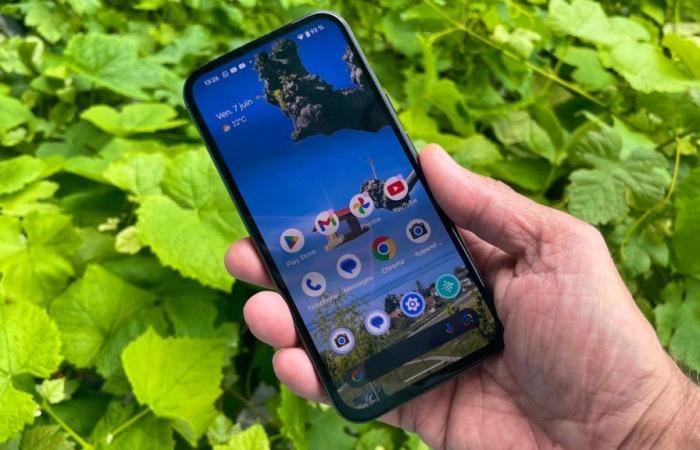While it is now very easy to explode the price of high-end smartphones by pushing them well beyond the 1000 francs barrier for the smallest of the options not included in the base price, Google persists in supplying the mid-range segment with models that are more than an illusion.
The proof is provided with the Pixel 8a, a new model released in Switzerland in the middle of May 2024. This model is located in the same family as the Pixel 8 and the Pixel 8 Pro, released in October 2023. They are both better equipped than the 8a on paper, but also more expensive (549 or 649 francs for the 8, from 749 to 949 for Pro). The 8a, in Switzerland, is just under 500 francs, for the base model, and 560 francs for the model with double the memory, from 128 GB to 256 GB). It is likely that prices will drop significantly in a few months. For those who are not participating in the arms race, this is an affordable smartphone.
In hand, the Pixel 8a is characterized by its lightness, 188 g, and its curves that are pleasant to the eye and to the touch. Added to this are reasonable dimensions (152.1 x 72.7 x 8.9 mm) which make it a device that fits easily in your pocket. Although his back was plastic, at no time did we have the feeling of an unbearable descent into trashy material. Especially since the matte surface barely shows fingerprints.
The effective brightness of its OLED screen immediately surprised and seduced us. Even in full sun, his consultation remained very pleasant. In addition, you barely notice that the black border of the screen is a little thicker than the higher models. Note that the smoothness of scrolling is set by default at 60 Hz in the display options, but that it can be increased to 120 Hz. The smartphone then loses slightly in autonomy without this turning out to be catastrophic.
We of course put the 8a to the test on its ability to take photos and videos and we found absolutely nothing to criticize it even if this model does not have all the refinements of its big brothers. The photos seemed to us to be of good quality, their colorimetry in particular and the possibilities of stabilizing the frames in video seemed far from unworthy.
We also note that the 8a is equipped with the same processor (its nickname Google Tensor G3) as the 8 and 8 Pro. The device therefore has the power necessary to optimally run the most demanding applications, video games in particular.
It is also, apparently, a processor designed for artificial intelligence (AI). AI, let’s talk about it. One thing is certain, this is going to be the workhorse of all manufacturers, now already, but also in the coming weeks, months and years. The 8a seems to be taking the lead since it is practically the only one in its category to natively offer services that use its proclaimed “smart” chip. We noted, for example, the tool which allows us to select parasitic soundtracks in a video and eliminate them to keep only the one we want, the timbre of our voice for example.
We also noted the process which, in a photo, allows you to circle a detail (a bottle of wine for example) and erase it as if it had never been placed on the wine table. And we’re not even talking about the very recent arrival of “Gemini”, an application entirely designed to make use of generative AI (this is a bit off topic, because Gemini is not specific to 8, the app is present on most Android smartphones and soon even on iOS).
To be honest, it is still difficult to fully understand how AI, at least as it is currently sold by manufacturers, is revolutionary. Above all, we have difficulty correctly interpreting whether a new function is possible because the AI has stroked its arm. Or because it is the fruit of the know-how, common sense and ergonomic sense of a programmer. It will take time to assimilate and differentiate.
But as it stands, Google offers an alternative to the terribly high-end flagships of Apple and Samsung, with a more modest product, but which knows how to stand out in the departments that count.
The cute coup attempt on Apple’s AI
Described as a latecomer in terms of adopting generative AI for its electronic devices, Apple attempted last Monday, during its last Keynote, a clever move that could be compared to an attempted coup d’état: renaming the AI (Artificial Intelligence) by AI (Apple Intelligence). An appropriation which seems to demonstrate the reluctance of the Apple firm to concede its delay over the precursors, OpenAI (ChatGPT) in the first place.
The iPhone manufacturer demonstrated on Monday June 10 its desire to enter the race and even take the lead in outpacing its competitors. Did he succeed? Those committed to the cause are convinced of it, the others are still asking to see.
Still, Apple has taken care to consolidate its promise that it seems to cherish most: the protection of privacy. Knowing that AI in applications can require considerable computing power, it is considered that our new devices which use it will seek it from external servers, with all the risks of leakage and exploitation by others. our personal data.
Apple built its Apple Intelligence on two floors. In the first, with an AI where everything is calculated by the device. This explains why only the new iPhone 15 Pro and 15 Pro Max (or iPad) will be able to manage the new functions presented last Monday. The latter being equipped with the most powerful chip in their assortment. It also allows Apple to promise that what happens in an iPhone stays in the iPhone.
The second floor is Apple’s project to use ChatGPT for services impossible to manage with the device’s chip alone and therefore to make its darlings communicate with external servers. In this case, all alerts deemed useful would be given to the user so that, if they decide to get started, they do so with full knowledge of the facts…
And Google, and the others, in all this? The night is young.






